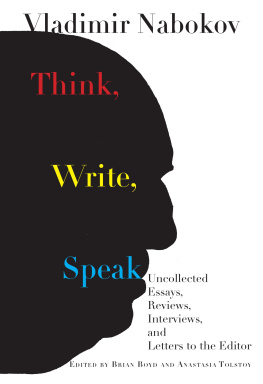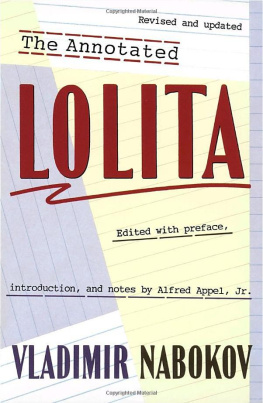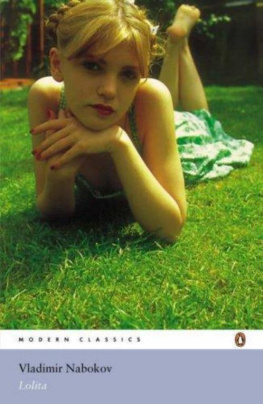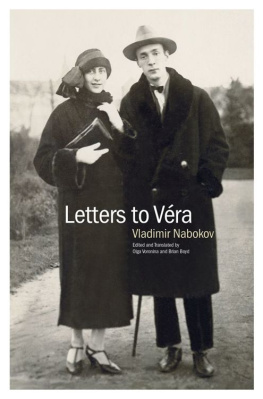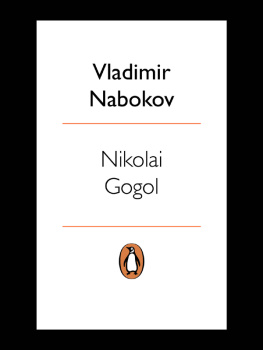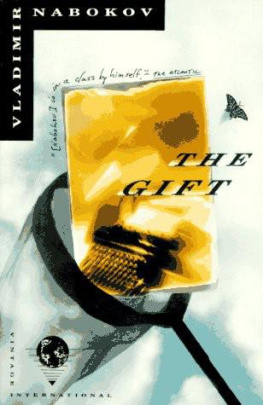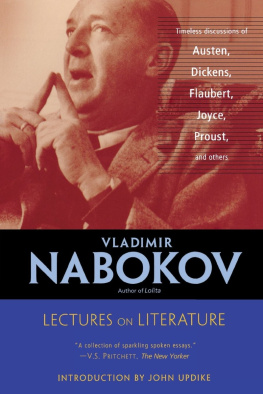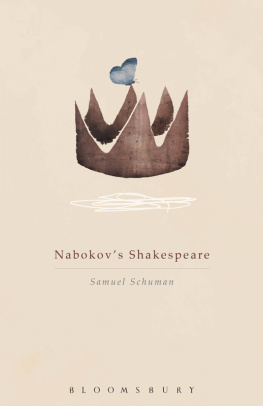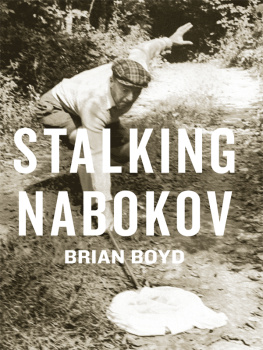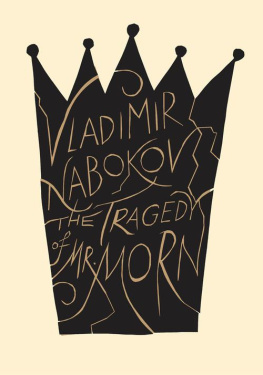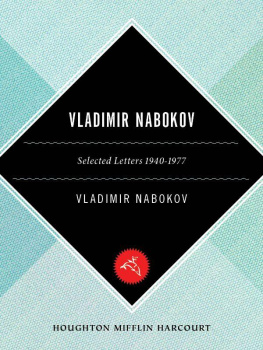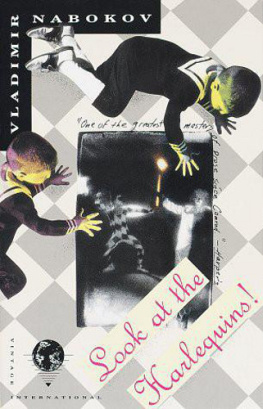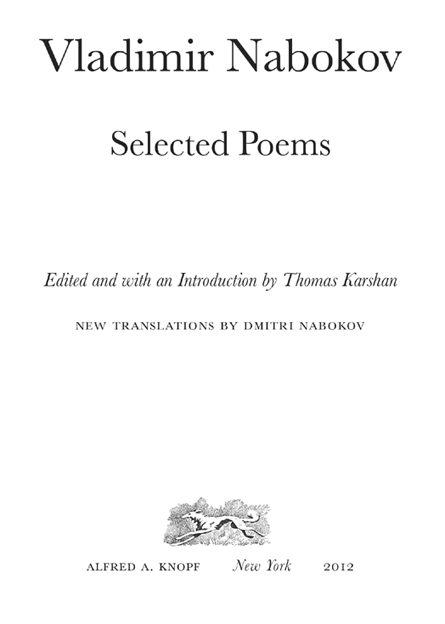THIS IS A BORZOI BOOK
PUBLISHED BY ALFRED A. KNOPF Copyright 2012 by The Estate of Vladimir Nabokov
Introduction and editorial material copyright 2012 by Thomas Karshan All rights reserved. Published in the United States by Alfred A. Knopf, a division of Random House, Inc., New York, and in Canada by Random House of Canada, Limited, Toronto. www.aaknopf.com Knopf, Borzoi Books, and the colophon are registered trademarks of Random House, Inc. Translations of the following poems originally appeared in these publications: Fortune-telling and Like pallid dawn, my poetry sounds gently in
Nabokovian 43 (Fall 1999); The Demon and Spring in
Nabokovian 28 (Spring 1992); Forty-three years, forty-four years maybe and I have no need, for my nocturnal travels in
Nabokovian 40 (Spring 1998); The Glasses of St.
Joseph in Nabokovian 54 (Spring 2005); The Last Supper in Nabokovian 60 (Spring 2008); Peter in Holland and Ut Pictura Poesis in Nabokovian 51 (Fall 2003); Revolution in Paris Review 175 (Fall/Winter 2005); The Ruler in Nabokovian 24 (Spring 1990); St. Petersburg and To the Grapefruit in Nabokovian 42 (Spring 1999); Shakespeare in Nabokovian 20 (Spring 1988); Tolstoy in The New York Review of Books 35, no. 3 (3 March 1988); To Vra in Nabokovian 23 (Fall 1989); The Train Wreck in Nabokovian 22 (Spring 1989); Dream, Easter, The Skater, and Evening in Aret 13 (Winter 2003). An earlier version of the translation of Evening was published in The Achievements of Vladimir Nabokov, edited by G. Gibian and S. J.
Parker (Ithaca, N.Y.: Cornell University Press, 1984). Butterflies is from Nabokovs Butterflies, edited by Brian Boyd and Robert Michael Pyle (Boston: Beacon Press, 2000). The following English-language poems originally appeared in these publications: Dandelions in Russian Literature Triquarterly 24 (1991); Dream in Atlantic Monthly 178, no. 3 (September 1946); Exile in The New Yorker 18, no. 36 (24 October 1942); Home in Trinity Magazine (Cambridge) 2, no. 7 (28 April 1966); A Poem in Atlantic Monthly 171, no. 1 (January 1943); Remembrance in English Review (London) 144 (November 1920); The Russian Song in Carrousel (Berlin) 2 (1923); and Softest of Tongues in Atlantic Monthly 168, no. 6 (December 1941). 6 (December 1941).
All remaining poems, with the exception of the following newly translated poems Cubes, The Hawkmoth, Music, A Trifle, and The University Poem, originally appeared in Poems and Problems (New York: McGraw-Hill, 1970). Library of Congress Cataloging-in-Publication Data Nabokov, Vladimir Vladimirovich, 18991977.
Selected poems / by Vladimir Nabokov; edited by
Thomas Karshan ; new translations by Dmitri Nabokov.
pages; cm
Includes bibliographical references and index.
eISBN: 978-0-307-95755-9
I.Karshan, Thomas, editor.II.Nabokov, Dmitri, translator.III.Nabokov, Vladimir Vladimirovich, 18991977. Poems. Selections. 2012. IV.
Nabokov, Vladimir Vladimirovich, 18991977. Poems. English. Selections. 2012. V.
Title.
PG 3476. N 3 A 2 2012
8 II .54dc23 2011051275 Cover photograph by Horst Tappe/Pix Inc./Time Life Pictures/Getty Images
Cover design by Carol Devine Carson v3.1
Contents
Introduction
Like Joyce, Nabokov was first a poet. It was, he tells us in his autobiography,
Speak, Memory (1967), the summer of 1914 when the numb fury of verse-making first came over me. Many, if not most, of these early poems were never published, though some did appear in his first collection,
Stikhi (
Poems), published in 1916 while the Nabokov family was still in Russia, and a few more in 1918, in a collection which also included the poems of a school friend, Andrei Balashov. After the Revolution, and the Nabokov familys emigration to Western Europe in 1919, Nabokov continued to write poetry, first as an undergraduate at Cambridge from 1919 to 1922, and then in Berlin, where he rejoined his family and entered the thriving literary culture of the Russian emigration. There he found public outlets for his verse in the Russian-language press, especially the Berlin migr newspaper
Rul (the
Rudder), of which Nabokovs father was a founder-editor; in turn, thirty-six of his poems were collected into a volume entitled
The Cluster in December 1922, and another 156 in
The Empyrean Path in January 1923.
After 1926, when Nabokov published his first novel, Mary, he wrote markedly fewer poems, and his lyric impulse was largely channeled into his novels: after all, Nabokov ranks alongside James Joyce, Marcel Proust, and Samuel Beckett as one of those great modernists who reinvented the novel as a vehicle for poetic prose. Indeed, his last and most important Russian novel, The Gift (published serially in 193738 and in its complete form in 1952), a fictionalized semi-autobiography, is the story of a young poet, Fyodor, successfully turning himself into a novelist. Nevertheless, the poems which Nabokov did write after 1926 make up in interest and individuality for their scarcity in comparison with his earlier output. They also complement the fiction, addressing many of the same ideas and themes; indeed many of these newer poems appeared alongside Nabokovs stories in the 1929 collection The Return of Chorb. After Chorb, Nabokov did not produce another collection of verse until the 1950s, when two slim volumes appeared: in 1952, Stikhotvoreniia19291951 (Poems19291951), which contains fifteen Russian poems, including a group of significant long poems he wrote in the late 1930s and early 1940s, and, in 1959, Poems, made up of fourteen of the poems Nabokov had written in English after going to America in 1940, most of which had first appeared in the New Yorker magazine. These fourteen poems were in turn republished in Poems and Problems in 1970, alongside thirty-nine of the Russian poems which Nabokov translated for the volume.
Finally, in 1979two years after his deathwas published another selection of the Russian poems, entitled, simply, Stikhi, or Poems. In addition to the major Russian poems of the period between 1925 and 1945, this volume also contained some of the earlier verse, including some previously unpublished poems. Since the late 1980s, Nabokovs son, Dmitria distinguished translator who worked with his father on turning many of the novels into Englishhas been publishing translations of Nabokovs poems in various journals. In the present volume, these translations (sometimes revised) are reprinted alongside translations that have never before appearedincluding Dmitri Nabokovs translation of the novella-length The University Poem (1927), which will make a significant addition to the corpus of his fathers work available in Russian, and Music, a poem from that poetry-writing summer of 1914, whose Russian original has never been printed, and which is therefore the earliest work by Nabokov now available. Also included are the nine poems written in English which Nabokov did not include in Poems and Problemsthese being the three early poems from 1920 to 1923, four poems from the 1940s, and a couple of slighter but still interesting pieces of verse. Four aspects of this edition should be noted.


